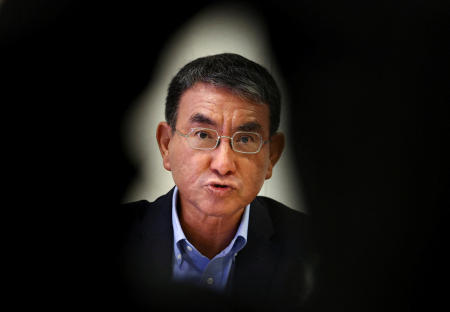
- ARAB NEWS
- 19 Aug 2025

TOKYO: Japan must raise interest rates and get its fiscal house in order to strengthen a weak yen that has pushed up inflation and brought pain to households, veteran ruling party lawmaker Taro Kono told Reuters on Tuesday.
The Bank of Japan (BOJ) ended a massive, decade-long stimulus programme last year and raised short-term rates to 0.5% in January, on the view that Japan was on the cusp of durably hitting its inflation target of 2%.
Kono, a former foreign minister who is touted as being among the candidates to become a future prime minister, said it was undesirable for inflation-adjusted real borrowing costs to stay negative for a long time.
“I think it’s better to start early,” he said in an interview, replying to a question on how soon the central bank should resume interest rate hikes.
“It’s important to send out a message that Japan will pull out of a situation where real interest rates are negative,” he said, stressing the need for the BOJ to keep raising rates gradually.
Asked about market expectations for the BOJ to raise rates again by year-end, Kono said, “I won’t comment on each move. But I feel like (rate hikes) have already come too late.”
While consumer inflation has kept above 2% for well over three years, the bank’s Governor Kazuo Ueda has stressed the need to tread cautiously on further rate hikes, due to an expected hit to the economy from U.S. tariffs.
Critics have blamed the slow pace of BOJ rate hikes for keeping the yen weak and pushing up import costs.
Once seen as a boon for Japan’s export-heavy economy, the weak yen is now the root cause of crippling inflation that is eroding corporate margins and hurting pensioners, Kono said.
The government and the BOJ must agree on a new economic framework that replaces so-called “Abenomics”, a mix of massive monetary and fiscal stimulus deployed by former premier Shinzo Abe in 2013 to end deflation, he said.
“The BOJ should gradually raise interest rates, while the government should restore fiscal health under a new accord that replaces ‘Abenomics’,” Kono said.
“The best step to combat rising living costs would be to reverse the weak yen and seek a somewhat stronger yen.”
Kono ran unsuccessfully in last year’s race to lead the ruling Liberal Democratic Party (LDP) that was won by incumbent premier Shigeru Ishiba.
The LDP’s huge loss in last month’s upper house election has provoked growing calls within the party for Ishiba to step down, and to hold another race to choose a new leader.
Kono declined to comment when asked whether he would run again if the LDP were to hold another leadership race.
Reuters